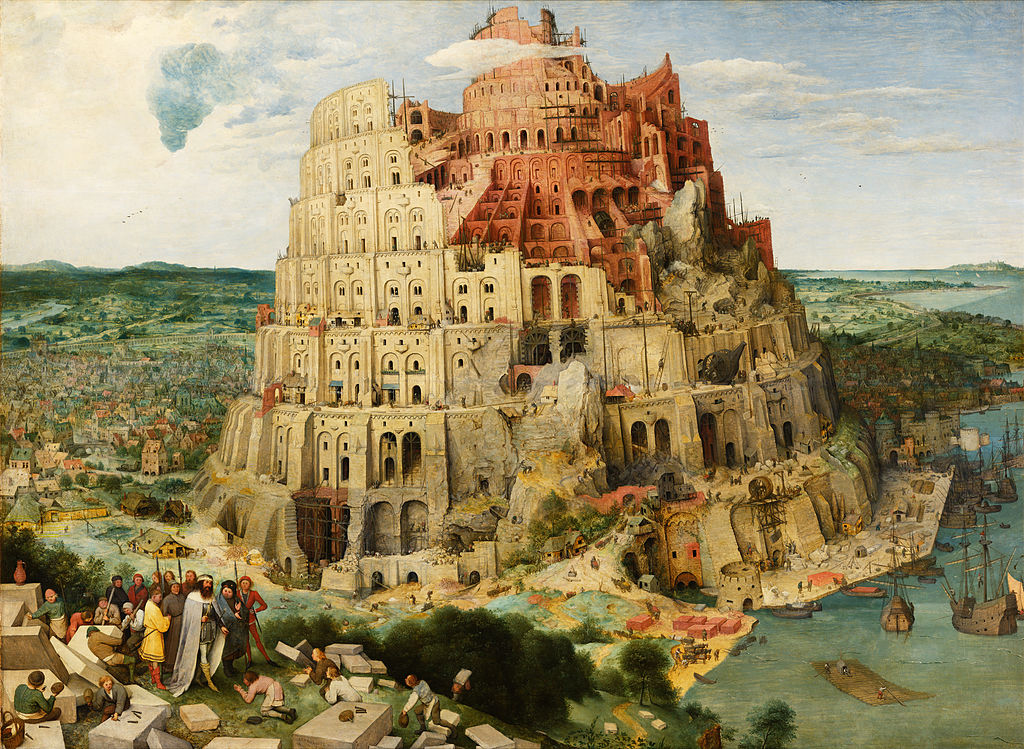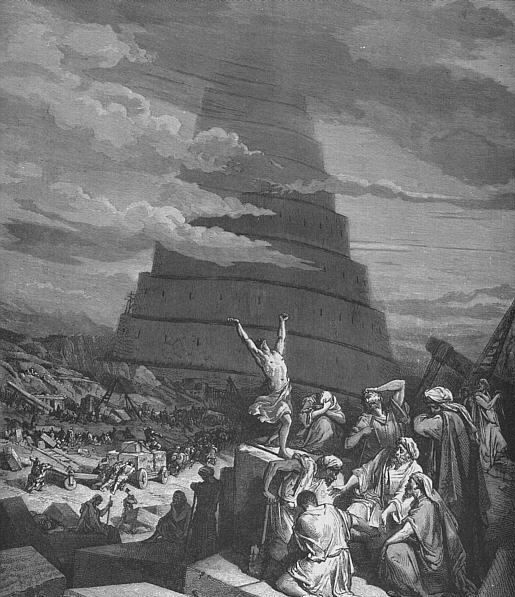Pentecost
Getting Un-clumped
Genesis 11:1-9
Pentecost
Analysis by Chris Repp
1Now the whole earth had one language and the same words. 2 And as they migrated from the east, they came upon a plain in the land of Shinar and settled there. 3 And they said to one another, “Come, let us make bricks, and burn them thoroughly.” And they had brick for stone, and bitumen for mortar. 4 Then they said, “Come, let us build ourselves a city, and a tower with its top in the heavens, and let us make a name for ourselves; otherwise we shall be scattered abroad upon the face of the whole earth.” 5 The Lord came down to see the city and the tower, which mortals had built. 6 And the Lord said, “Look, they are one people, and they have all one language; and this is only the beginning of what they will do; nothing that they propose to do will now be impossible for them. 7 Come, let us go down, and confuse their language there, so that they will not understand one another’s speech.” 8 So the Lord scattered them abroad from there over the face of all the earth, and they left off building the city. 9 Therefore it was called Babel, because there the Lord confused the language of all the earth; and from there the Lord scattered them abroad over the face of all the earth.

The Tower of Babel by Pieter Bruegel the Elder Wikipedia
It is often said that Pentecost is the undoing of Babel, that the gift of the Spirit brings back together those whom God scattered. But if scattering really was God’s original intention for us, then Pentecost ought rather to be seen as an extension of God’s work at Babel.
Author’s Note: The Revised Common Lectionary includes this reading as an alternate first reading in place of Acts 2:1-21. I’m operating under the assumption that if this text were chosen for the first reading, the Acts reading would be chosen for the second.
DIAGNOSIS: Clumping
Step 1: Initial Diagnosis (External Problem): Sticking Together
In Genesis 1:28, God told the newly created humankind to “fill the earth and subdue it.” Here in chapter 11, humankind has other ideas. “Let’s stick together, all in one place, for our own safety, and build walls and a tower to protect ourselves.” Clumping is the problem. A century ago, clumping was also a problem for table salt in humid weather, until the Morton Salt company discovered that adding magnesium chloride could keep salt flowing in any humidity. Hence their motto, “When it rains, it pours.” Let’s see what God does for us instinctually-clumpy humans, so that we can be poured out as the “salt of the earth” we were created to be (see Matthew 5:13).
Step 2: Advanced Diagnosis (Internal Problem): Fear of Being Scattered
Why do we clump? Because we’re afraid, and we reckon that there is safety in numbers. Fear is our clumping agent. Lots of our fellow animals have this instinct too: herding animals, “birds of a feather,” fish, and insects such as bees and ants. We clump because we trust our instincts, our own judgment, over God’s word. God wants us scattered over the face of the whole earth. And that just sounds like the worst idea imaginable to us. The last thing we want is to be scattered.
Step 3: Final Diagnosis (Eternal Problem): Making a Name for Ourselves
Because not only is there safety in numbers, by our calculus, but there is also strength. Clumped together, God knows we can do anything we put our minds to, whatever we want, and in so doing make a name for ourselves through the mighty things we accomplish. Sounds great to us, but actually therein lies our problem, because as we have just seen, what we want is at odds with what God wants. It puts us directly in opposition to God’s good intentions for us, the purpose for which we were created. By clumping, we’ve made ourselves God’s opponent, God’s enemy.

The Confusion of Tongues by Gustave Doré Wikipedia
PROGNOSIS: Getting Un-Clumped
Step 4: Initial Prognosis (Eternal Solution): A Higher Name
The solution to our clumping begins with God pouring God’s self out for us in Jesus Christ (see Philippians 2:6-7ff). And it is God, not us, who is properly in the naming business. Just as God, in the next chapter of Genesis, promises to make Abram’s name great, so God in Christ’s self-emptying, his incarnation, death, and resurrection, gives him “the name that is above every name” (Phil. 2:9). But it is, paradoxically, his weakness and humiliation, and not the strength of numbers, walls, or towers, that vanquish the power of those things we most fear: sin, death, and evil.
Step 5: Advanced Prognosis (Internal Solution): Trust through God’s Scattering Spirit
Hearing of that victory (in our own language, see Acts 2:8), God the Scattering Spirit creates trust in us that those powers are now indeed conquered, and that in Holy Baptism we belong to the victor. Fear, our clumping agent, begins to dissipate.
Step 6: Final Prognosis (External Solution): Spirit Poured Out, Us Scattered Abroad
It is often said that Pentecost is the undoing of Babel, that the gift of the Spirit brings back together those whom God scattered. But if scattering really was God’s original intention for us, then Pentecost ought rather to be seen as an extension of God’s work at Babel. Now, however, instead of divisive confusion, we have unity in the gospel in the midst of our ongoing diversity. Unified in the gospel by the Spirit poured out upon us, and bearing the name of Christ, we rejoice in our scattering abroad to all the places near and far where the gospel’s good news is so sorely needed, confident that God can do what God has put God’s mind to.